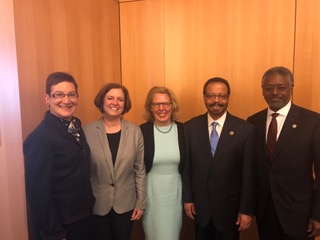 Innovation and advancements in biomedical and engineering research was the theme of this year’s Lasker Lecture and spring Biomedical Imaging Symposium hosted by Texas A&M University and the Houston Methodist Hospital’s EnMed program. Event attendees came together April 25-26 to share best practices and attend sessions led by some of the nation’s most renowned experts in the fields of medicine and engineering.
Innovation and advancements in biomedical and engineering research was the theme of this year’s Lasker Lecture and spring Biomedical Imaging Symposium hosted by Texas A&M University and the Houston Methodist Hospital’s EnMed program. Event attendees came together April 25-26 to share best practices and attend sessions led by some of the nation’s most renowned experts in the fields of medicine and engineering.
Dr. Roderic I. Pettigrew, CEO of EnHealth and executive dean of EnMed, gave the 2018 Lasker Lecture. The prestigious Lasker Lecture is an honor bestowed upon a distinguished individual, serves to advance public understanding and discourse about the ways in which we collectively pursue answers to questions posed by science and are intended to boost public understanding of the importance of biomedical research to society.
In conjunction with the lecture was the daylong spring Biomedical Imaging Symposium, which brought together interested parties for discussions concerning education, ways to spur innovation, and the future of the biomedical and engineering fields. Speakers included researchers and faculty members from M.D. Anderson, UCLA, the Mayo Clinic, Harvard Medical School, Houston Methodist Research Institute, Rice University, Texas A&M, the Center for Airborne Pathogen Research and Tuberculosis Imaging, and the Texas A&M Institute for Preclinical Studies.
“We are bringing together experts who share our vision to elevate discussion and inspire new ideas at the intersection of engineering and medicine,” said Dr. M. Katherine Banks, dean of Texas A&M Engineering, in an opening address to attendees. “In the not-so-distant future, we could engage robo-diagnosticians who prescribe custom 3-D printed pills conveniently delivered by drones to the patient’s location. I am confident Texas A&M and Houston Methodist will be well-regarded as pioneers in this new age.”
Dr. Carrie Byington, dean of the College of Medicine at the Texas A&M Health Science Center, echoed Banks’ sentiment. “We will all benefit as the domains of scientific discovery, technological innovation and health care converge. The EnMed program and the symposium embrace this future.”
EnMed is recognized as a first of its type innovative inter-institutional and intercollegiate academic and scholarly program. Launched as a venture among the College of Engineering, led by Banks; the College of Medicine, led by Byington; and the Houston Methodist Research Institute, led by President and CEO Dr. Mauro Ferrari, EnMed has emerged as a national model for convergence at the level of the practice – the unified practice of engineering and medicine.
EnMed’s curriculum was recently approved by Liaison Committee on Medical Education (LCME) accreditation, and the program is currently recruiting the inaugural class, which will enter in 2019. Each student enrolled in EnMed will have an undergraduate degree in engineering or computing science. Then in four years, they will earn their medical degree and a Master of Science in engineering. EnMed graduates will be both practicing physicians and trained engineers, poised to tackle some of health care’s greatest challenges through the invention of novel technologies.